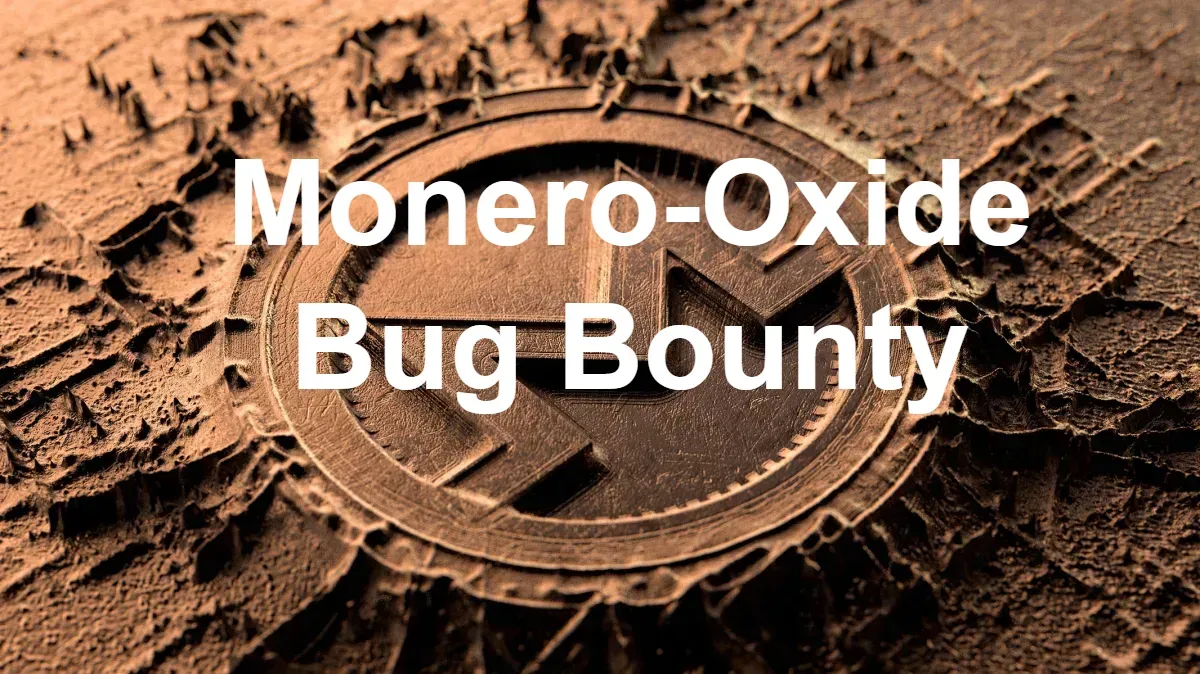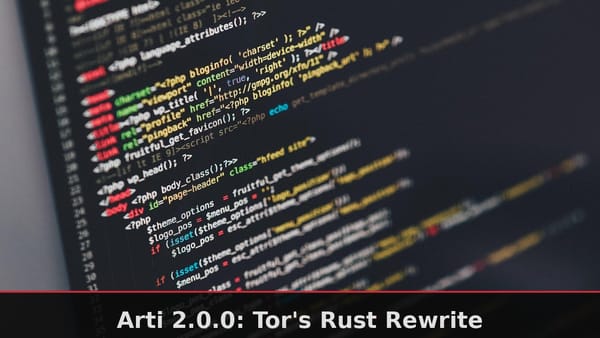Monero-Oxide Bug Bounty: Privacy Code Gets Real Money Behind It
While the IRS burned $625,000 trying to crack Monero's privacy in 2020, the community is now investing serious money to make sure nobody ever can.

Power Up Privacy just dropped $100,000 on a bug bounty for Monero-oxide, a set of audited Rust libraries that reimplements Monero's transaction protocol from scratch. The bounty represents one of the largest independent security investments in Monero's recent history real money backing real security instead of volunteer goodwill and hope.
Monero-oxide evolved from monero-serai, kayabaNerve's (Luke Parker) two-year project building Monero infrastructure for Serai DEX. The libraries reconstruct how Monero transactions work at the protocol level, from ring signatures to bulletproofs. The transition to monero-oxide creates an independent organization headed by kayabaNerve and boog900 from Cuprate, ensuring these libraries serve the entire ecosystem rather than any single project.

The crown jewel of the implementation is FROSTLASS, a threshold multisignature protocol that Cypher Stack proved secure. Current Monero multisig uses O(n!) complexity exponentially slower with more signers. FROSTLASS achieves constant per-participant upload complexity and linear computational complexity. Ten signers means the difference between impossible and practical.
The existing multisig implementation relies on a novel high-complexity DKG (Distributed Key Generation) and a signing protocol that lacks formal verification. Developers essentially fly blind on critical security infrastructure. FROSTLASS brings mathematical proof to replace hope and prayer.

Beyond multisig, monero-oxide provides complete transaction parsing, handling, and stateless verification. The monero-wallet library offers a high-level API that works everywhere from desktop applications to embedded devices, including deterministically derived transaction keys for payment proofs and atomic swap support.
The shift to Rust addresses memory safety bugs that account for 70% of security vulnerabilities in systems programming. Rust's ownership model eliminates use-after-free, double-free, and buffer overflow vulnerabilities at compile time. These bug classes plague C and C++ codebases like Monero's current implementation.
Cuprate uses monero-oxide libraries for its complete Monero daemon rewrite. Multiple implementations mean bugs in one leave the network operational through the others defense in depth at the protocol level. When one implementation fails, the network keeps running.
Power Up Privacy, the group funding this bounty, describes themselves as successful developers supporting the "silent heroes" who maintain privacy tools. They fund selectively but substantially. The $100,000 dwarfs typical Monero bounties that cap out at 10% of available community funds per bug. The IRS burned $625,000 trying to crack Monero in 2020 and failed. Now the community invests comparable resources ensuring they keep failing.
The timing matters. Exchanges continue delisting privacy coins under regulatory pressure. The EU's anti-money laundering regulations effectively ban privacy-preserving cryptocurrencies from regulated exchanges. Chainalysis and other surveillance companies claim increasingly sophisticated tracking capabilities. The privacy community's response comes through better code, deeper audits, and bigger bounties.
Monero-oxide has been released, with a $100,000 bug bounty (sponsored by Power Up Privacy)! https://t.co/GrkkHpeDjo
— Monero (XMR) (@monero) September 10, 2025
Bug hunters face significant technical challenges with monero-oxide. The FROSTLASS protocol needs battle-testing despite formal verification edge cases in threshold signatures could compromise multisig wallets. Transaction parsing handles untrusted network input where malformed transactions might trigger panics or consensus splits. Rust prevents memory bugs but not timing side-channels that could leak private keys. The atomic swap functionality introduces complex state machines where race conditions could lock funds or enable double-spends.
Monero-oxide already powers Serai DEX's ground-up implementation supporting Bitcoin, Ethereum, DAI, and Monero through threshold multisig wallets. Cuprate relies on it for transaction verification. Future wallet implementations will leverage its clean API design. The community funding proposal for auditing these libraries shows grassroots support extends beyond Power Up Privacy's contribution.
Every exploited bug in privacy infrastructure hands victory to surveillance. The recent wallet bug leaked transaction metadata when users connected to malicious remote nodes users thought they had privacy while hemorrhaging data to adversaries. The $100,000 bounty creates proper incentives for responsible disclosure instead of selling exploits to surveillance companies or criminal organizations.
Finding these bugs requires understanding Monero's transaction protocol at the mathematical level, Rust's ownership and lifetime system, cryptographic protocol analysis, and distributed systems consensus. The bounty size reflects the expertise required you need deep technical knowledge to discover and exploit vulnerabilities worth six figures.
The monero-oxide release with Power Up Privacy's backing shows the privacy ecosystem maturing beyond ideological volunteerism. Real money backs critical infrastructure. For developers, the nascent but funded Rust ecosystem around Monero offers opportunity at the intersection of privacy technology and modern systems programming. For users, formally verified protocols, memory-safe implementations, and serious bug bounties create multiple layers of defense.
The surveillance state spent $625,000 trying to break Monero and failed. The community now invests $100,000 ensuring continued failure. Privacy wins through better code and bigger bounties, not wishful thinking.




